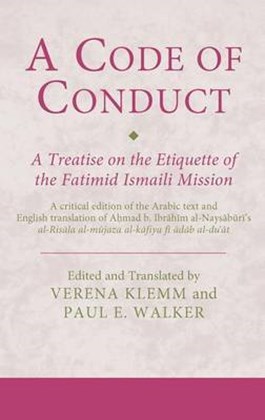A Code of Conduct A Treatise on the Etiquette of the Fatimid Ismaili Mission: A critical edition of the Arabic text and English translation of Aḥmad b. Ibrāhīm al-Naysābūrī's al-Risāla al-mūjiza al-kāfiya fī ādāb al-duʿāt
I.B. Tauris in association with the Institute of Ismaili Studies
The Risāla al-mūjāza al-kāfiya fī adab al-duʿāt (A Brief and Concise Treatise on the Code of Conduct for the Dāʿīs) constitutes the only extant work in Ismaili literature that deals with specific practical aspects of the Ismaili daʿwa, an appeal and encouragement to the faith.
Written by the Fatimid author Ahmad b. Ibrahim al-Naysābūrī (11th century CE), it represents a normative guide for the Ismaili dāʿīs, who functioned as the religious agents and ‘summoners’ responsible for the leadership, instruction and spiritual and social welfare of the Ismaili community.
Al-Naysābūrī’s enumeration of the dāʿīs’ ideal traits and attributes in the Risāla al-mūjāza belongs to the wider genre of ‘professional adab’ literature that exclusively addresses groups belonging to certain occupations and instructs them in specific ethical principles and codes of conduct, and which is prevalent in classical Muslim culture. It may also be located in the even older tradition of the Mirror of Princes literature, which dates back to pre-Islamic Persia, and which promoted the ideal practice of rulership.
Indeed, many of the characteristics of the dāʿī listed in the Risāla are consistent with the topoi in the Mirror of Princes literature as it relates to the ruler, namely the virtues of piety, chastity, uprightness, mercy, forgiveness, humility and generosity. In this regard, the communal functions of a da‘i also mirror the duties traditionally ascribed to a responsible ruler — that he has to maintain the community, protect the weak, and fight and punish crime, corruption and social disintegration — but with the one key distinction that they are, in this instance, always elaborated within the context of the Ismaili dawa.
The present work constitutes a critical edition and translation of the Risāla al-mūjāza al-kāfiya fī adab al-duʿāt. Al-Naysābūrī’s treatise is a fascinating testimony to the wide network of a class of individuals charged with proclaiming the daʿwat al-ḥaqq (‘call to truth’) over various frames of time and space. It is thus a valuable resource for students and scholars interested in medieval Islamic literature more generally and the structure and workings of the Fatimid daʿwa in particular.
Acknowledgements
Introduction
Context, author and work
Transmission of the Risāla al-mūjāza al-kāfiya fī adab al-duʿāt
Literary tradition
Reflections of history and intertextuality
Structure, contents and style
Manuscripts and editions
The date of the Risāla al-mūjāza by Paul E. Walker
Translation of al-Risāla al-mūjāza al-kāfiya fī adab al-duʿāt: A Brief and Concise Treatise on the Code of Conduct for the Dāʿīs
Select Bibliography
English Index
Arabic Index
Arabic Text
Verena Klemm is Professor and Chair of the Institute of Arabic Studies at the University of Leipzig in Germany. A specialist in medieval Muslim history and Arabic literature, Professor Klemm obtained her doctorate in Islamic Studies from the University of Tübingen in 1988 and her habilitation from the University of Hamburg in 1997. Dr Klemm has authored and edited several books including Die Mission des fatimidischen Agenten al-Muayyad Fi’d-dīn in Širaz (Frankfurt: Peter Lang, 1989),Literarisches Engagement im arabischen Nahen Osten: Konzepte und Debatten (Würzburg: Ergon, 1998), Understanding Near Eastern Literatures: A Spectrum of Interdisciplinary Approaches (with Beatrice Gruendler; Wiesbaden: Ludwig Reichart, 2000), and most recently, Memoirs of a Mission: The Ismaili Scholar, Statesman and Poet, al-Muʾayyad fī’l-Dīn al-Shirāzī (London: I. B. Tauris in association with The Institute of Ismaili Studies, 2003).
An historian of ideas with a focus on Mediaeval Islamic History, Paul E. Walker has taught at McGill University, Columbia University and the University of Michigan. For several years Dr Walker was the Director of the American Research Centre in Egypt, and is currently a Visiting Scholar with the University of Chicago's Center for Middle Eastern Studies. He has authored and edited many books on Fatimid history and the formative period of Ismaili thought including Early Philosophical Shi‘ism (Cambridge University Press, 1993), (University of Utah Press, 1994), Abū Yaʿqūb al-Sijistānī: Intellectual Missionary (I. B. Tauris in association with The Institute of Ismaili Studies, 1996), Ḥamīd al-Dīn al-Kirmānī: Ismaili Thought in the Age of al-Ḥākim (I. B. Tauris in association with The Institute of Ismaili Studies, 1999), with Wilferd Madelung, An Ismaili Heresiography (Brill, 1998) and The Advent of the Fatimids: A Contemporary Shi'i Witness (I. B. Tauris in association with The Institute of Ismaili Studies, 2000). Most recently, Dr Walker is the recipient of the 2001 Guggenheim Fellowship to study the Imam-Caliph al-Ḥākim.

